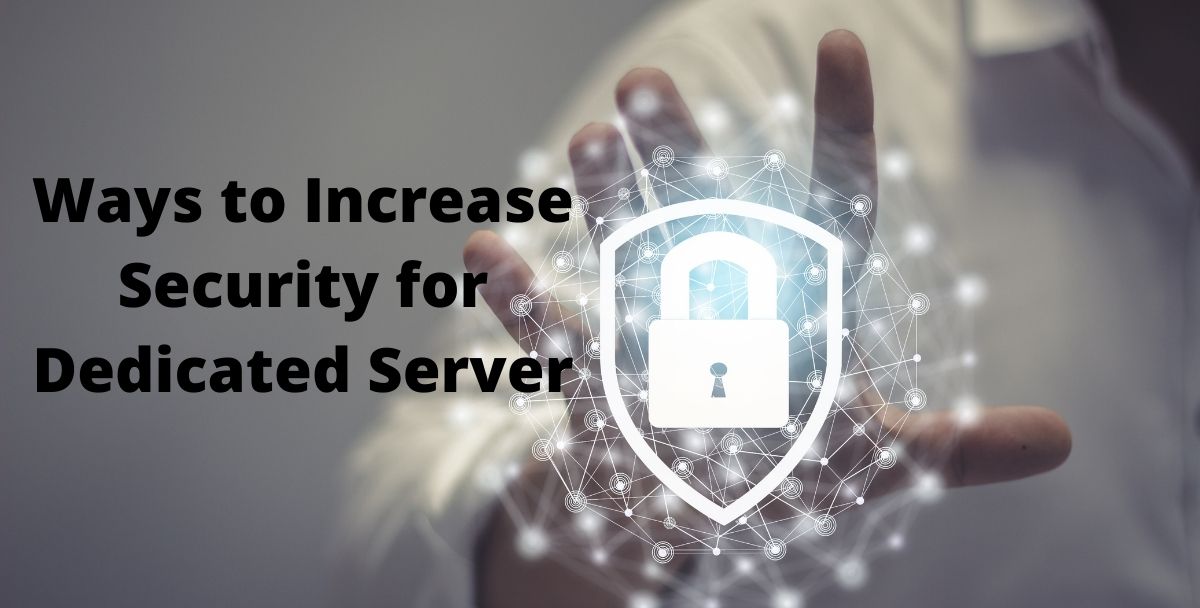Ways to Increase Security for Dedicated Server

If you’re hosting a website that has important data and is crucial for your business, it is only a wise decision to host it on a dedicated server. With a dedicated server, you’re already reducing the risk of malware that comes with sharing your server with several other websites (like in a shared server). A dedicated server gives you complete control over your website’s security which makes it much safer to use.
However, simply hosting a website on a dedicated server might not be enough if you’re looking to have a strongly locked website. You will have to take extra steps to make sure that your website is malware-proof on the internet. In this article, we are going to discuss 7 important ways in which you can increase security on your website when it is hosted on a dedicated server.
Invest in a good hosting provider
The first and foremost step is to invest in a good security provider. Many managed hosting services will also help you have security solutions for free. Hostgator, one of the biggest hosting providers, has a bunch of security features like SSL certificates within its hosting plan itself. So you don’t even have to invest separately in security features. In order to get these free benefits, you may have to use hosting coupons from GrabOn. By using these coupons you can also save up to 50% on hosting.
2. Keep the server up to date
Technology advances all the time. As requirements change, tech experts continue to innovate. Webmasters need to make their websites more customer-friendly in order to increase conversion rates and gain more business. Thus, updates are also released frequently. With every new update, bug fixes and security measures can be enhanced. Sticking to older versions makes the server vulnerable to viruses.
3. Install DDoS protection
Before seeing what’s the need to get, let’s see what it really is. Distributed Denial of Service is set to produce what looks like website traffic but isn’t. This large amount of fake traffic leads to downtimes, an increase in latency, or even website crashes. Installing DDoS protection will reduce the risk of such breaches. You can purchase DDoS protection depending on what size of attack you want to protect your website against. You can get a DDoS protection plan from a web host along with your hosting plan, sometimes, for free.
4. Login using trusted networks
It might be tempting to join an open signal in a coffee shop or a mall. But you might be unaware of the loosely secured wireless connections. Connecting to such networks means putting your site at risk. You can protect your server by simply making sure that you connect only to secure and trustworthy networks. Many open networks are connected to various small devices thus putting your server at high risk.
5. Monitor the LAN connection
Even if your computer might not be the one infected with the virus, it is very much possible that the different computers connected to the LAN networks could be. It depends on the security of each of those computers in the network, and any infection can transfer from one PC to another very easily inside a network. Make sure that you connect your computer to a network of systems where security is given high priority. Make it a habit to include firewalls, timely scannings, and data backups to stay one step ahead of cyberattacks.
6. Back up the data
If you are prepared for the worst, you are already ahead of so many webmasters out there. So make data backups a very important step in your to-do list. You don’t want to lose out on data in case of an unexpected virus breach. Unexpected viruses can have devastating impacts. There have been many cases of ransomware recorded in recent times that caused heavy losses to businesses in terms of money and data both. The least that you can do to protect your data is to back it up so you don’t lose important information about your customers, products and services.
7. Limit access
Have a password-protected account that only a few can manage. If required you can create users with restricted permissions. You can also block unwanted users into the system to improve its security. It’s not rude, just wise!
Security and malware are like 2 horses racing against each other. The faster one horse runs, the speed of the other increases. But If you had a horse with a broken leg, the other might outrun it. Security breaches and software updates can similarly outdo your security measures if they’re not effective enough. Hackers can reach into your system and outdo you when server security is poor, just like an ill horse. But a few effective security measures that work for your business might help you always stay ahead in the game.
About the author
Aamer Hussain is a content writer and Strategist who writes about web hosting and e-commerce solutions.
